Business Law Case Study: Contract Formation and Validity
VerifiedAdded on 2021/04/24
|5
|1332
|186
Case Study
AI Summary
This case study examines contract law principles within the context of an Australian business law scenario. The analysis focuses on whether valid contracts were formed between various parties, including Nick and John, Nick and the police, Nick and Hanson, and Nick and Ian. The document meticulously applies the essentials of a valid contract, such as offer, acceptance, and consideration, to the facts presented. It distinguishes between an offer and an invitation to treat and addresses the concept of consideration, including past consideration and existing contractual duties. The analysis concludes by determining the existence or non-existence of contracts between each pair of parties, supported by relevant case law, such as Carlill v Carbolic Smoke Ball Company and Collins v Godefroy. The study also provides a comprehensive reference list of the cited cases.
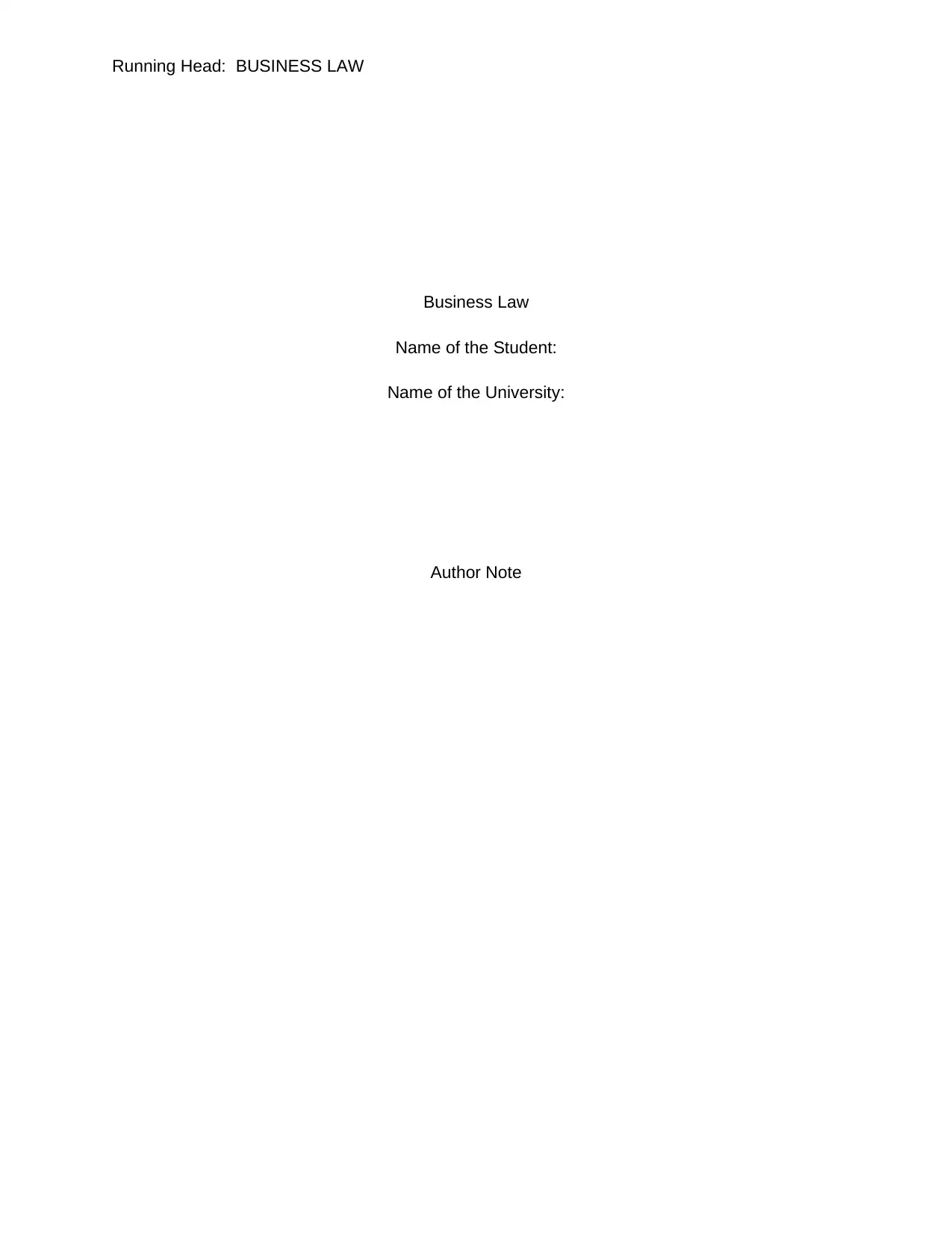
Running Head: BUSINESS LAW
Business Law
Name of the Student:
Name of the University:
Author Note
Business Law
Name of the Student:
Name of the University:
Author Note
Paraphrase This Document
Need a fresh take? Get an instant paraphrase of this document with our AI Paraphraser
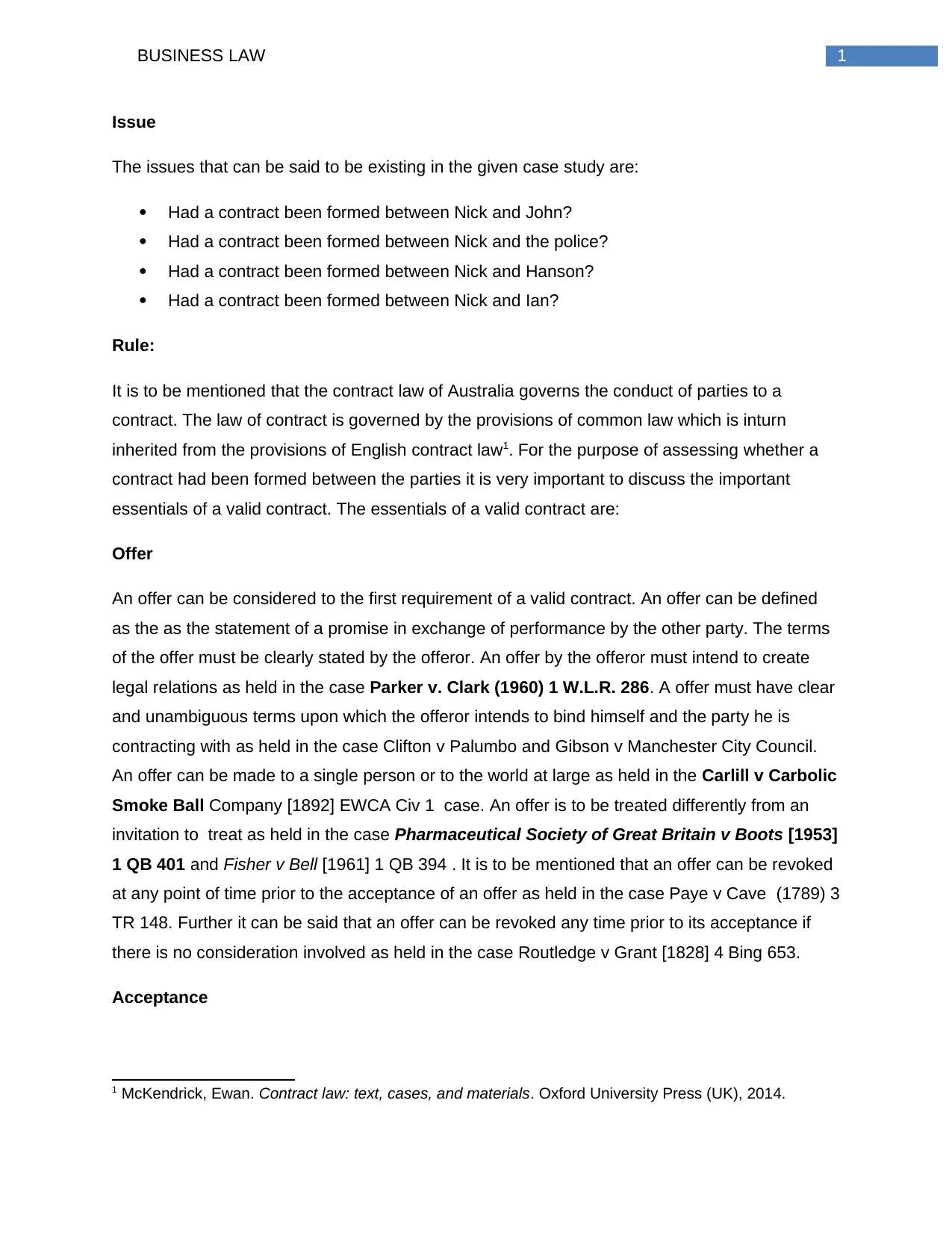
1BUSINESS LAW
Issue
The issues that can be said to be existing in the given case study are:
Had a contract been formed between Nick and John?
Had a contract been formed between Nick and the police?
Had a contract been formed between Nick and Hanson?
Had a contract been formed between Nick and Ian?
Rule:
It is to be mentioned that the contract law of Australia governs the conduct of parties to a
contract. The law of contract is governed by the provisions of common law which is inturn
inherited from the provisions of English contract law1. For the purpose of assessing whether a
contract had been formed between the parties it is very important to discuss the important
essentials of a valid contract. The essentials of a valid contract are:
Offer
An offer can be considered to the first requirement of a valid contract. An offer can be defined
as the as the statement of a promise in exchange of performance by the other party. The terms
of the offer must be clearly stated by the offeror. An offer by the offeror must intend to create
legal relations as held in the case Parker v. Clark (1960) 1 W.L.R. 286. A offer must have clear
and unambiguous terms upon which the offeror intends to bind himself and the party he is
contracting with as held in the case Clifton v Palumbo and Gibson v Manchester City Council.
An offer can be made to a single person or to the world at large as held in the Carlill v Carbolic
Smoke Ball Company [1892] EWCA Civ 1 case. An offer is to be treated differently from an
invitation to treat as held in the case Pharmaceutical Society of Great Britain v Boots [1953]
1 QB 401 and Fisher v Bell [1961] 1 QB 394 . It is to be mentioned that an offer can be revoked
at any point of time prior to the acceptance of an offer as held in the case Paye v Cave (1789) 3
TR 148. Further it can be said that an offer can be revoked any time prior to its acceptance if
there is no consideration involved as held in the case Routledge v Grant [1828] 4 Bing 653.
Acceptance
1 McKendrick, Ewan. Contract law: text, cases, and materials. Oxford University Press (UK), 2014.
Issue
The issues that can be said to be existing in the given case study are:
Had a contract been formed between Nick and John?
Had a contract been formed between Nick and the police?
Had a contract been formed between Nick and Hanson?
Had a contract been formed between Nick and Ian?
Rule:
It is to be mentioned that the contract law of Australia governs the conduct of parties to a
contract. The law of contract is governed by the provisions of common law which is inturn
inherited from the provisions of English contract law1. For the purpose of assessing whether a
contract had been formed between the parties it is very important to discuss the important
essentials of a valid contract. The essentials of a valid contract are:
Offer
An offer can be considered to the first requirement of a valid contract. An offer can be defined
as the as the statement of a promise in exchange of performance by the other party. The terms
of the offer must be clearly stated by the offeror. An offer by the offeror must intend to create
legal relations as held in the case Parker v. Clark (1960) 1 W.L.R. 286. A offer must have clear
and unambiguous terms upon which the offeror intends to bind himself and the party he is
contracting with as held in the case Clifton v Palumbo and Gibson v Manchester City Council.
An offer can be made to a single person or to the world at large as held in the Carlill v Carbolic
Smoke Ball Company [1892] EWCA Civ 1 case. An offer is to be treated differently from an
invitation to treat as held in the case Pharmaceutical Society of Great Britain v Boots [1953]
1 QB 401 and Fisher v Bell [1961] 1 QB 394 . It is to be mentioned that an offer can be revoked
at any point of time prior to the acceptance of an offer as held in the case Paye v Cave (1789) 3
TR 148. Further it can be said that an offer can be revoked any time prior to its acceptance if
there is no consideration involved as held in the case Routledge v Grant [1828] 4 Bing 653.
Acceptance
1 McKendrick, Ewan. Contract law: text, cases, and materials. Oxford University Press (UK), 2014.
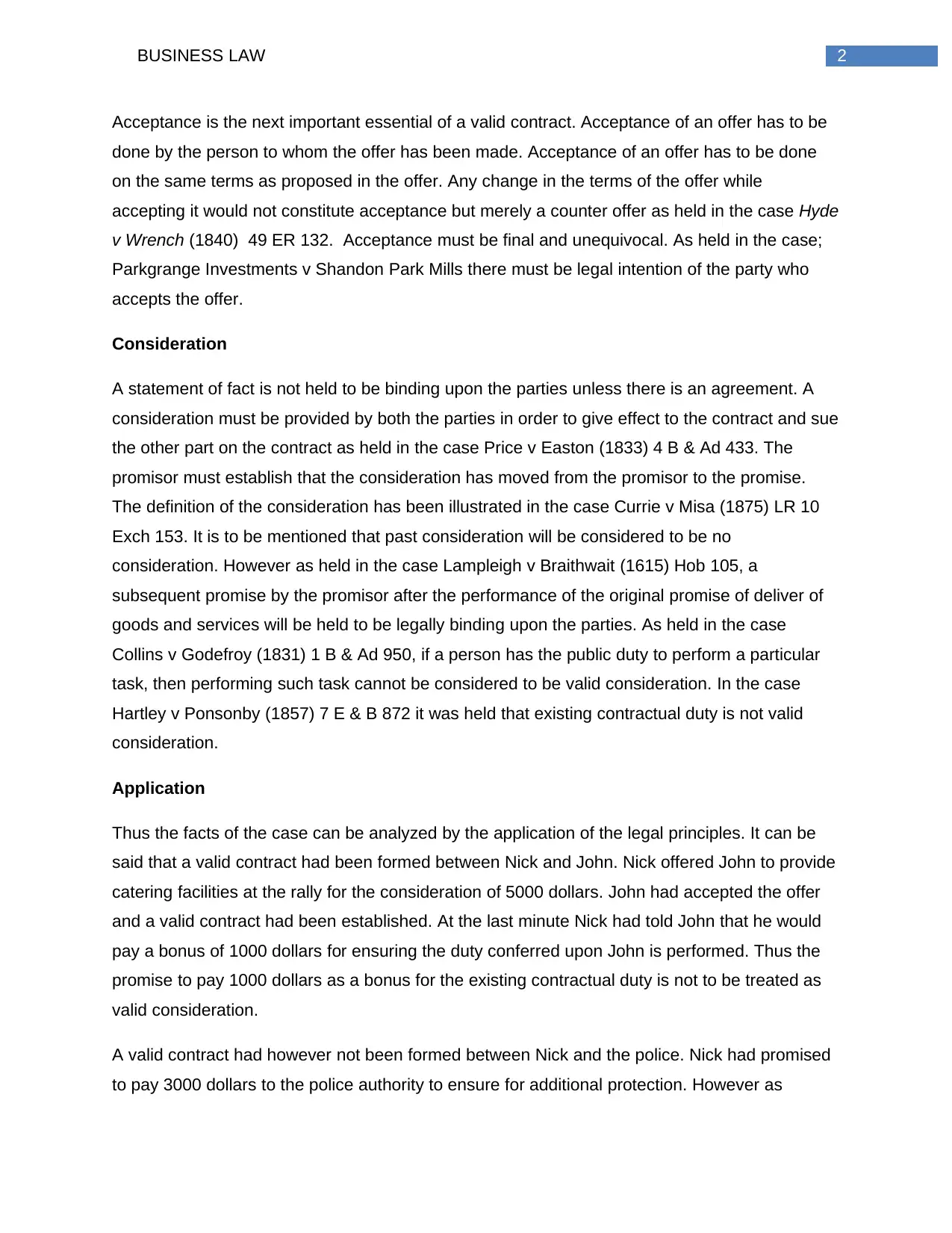
2BUSINESS LAW
Acceptance is the next important essential of a valid contract. Acceptance of an offer has to be
done by the person to whom the offer has been made. Acceptance of an offer has to be done
on the same terms as proposed in the offer. Any change in the terms of the offer while
accepting it would not constitute acceptance but merely a counter offer as held in the case Hyde
v Wrench (1840) 49 ER 132. Acceptance must be final and unequivocal. As held in the case;
Parkgrange Investments v Shandon Park Mills there must be legal intention of the party who
accepts the offer.
Consideration
A statement of fact is not held to be binding upon the parties unless there is an agreement. A
consideration must be provided by both the parties in order to give effect to the contract and sue
the other part on the contract as held in the case Price v Easton (1833) 4 B & Ad 433. The
promisor must establish that the consideration has moved from the promisor to the promise.
The definition of the consideration has been illustrated in the case Currie v Misa (1875) LR 10
Exch 153. It is to be mentioned that past consideration will be considered to be no
consideration. However as held in the case Lampleigh v Braithwait (1615) Hob 105, a
subsequent promise by the promisor after the performance of the original promise of deliver of
goods and services will be held to be legally binding upon the parties. As held in the case
Collins v Godefroy (1831) 1 B & Ad 950, if a person has the public duty to perform a particular
task, then performing such task cannot be considered to be valid consideration. In the case
Hartley v Ponsonby (1857) 7 E & B 872 it was held that existing contractual duty is not valid
consideration.
Application
Thus the facts of the case can be analyzed by the application of the legal principles. It can be
said that a valid contract had been formed between Nick and John. Nick offered John to provide
catering facilities at the rally for the consideration of 5000 dollars. John had accepted the offer
and a valid contract had been established. At the last minute Nick had told John that he would
pay a bonus of 1000 dollars for ensuring the duty conferred upon John is performed. Thus the
promise to pay 1000 dollars as a bonus for the existing contractual duty is not to be treated as
valid consideration.
A valid contract had however not been formed between Nick and the police. Nick had promised
to pay 3000 dollars to the police authority to ensure for additional protection. However as
Acceptance is the next important essential of a valid contract. Acceptance of an offer has to be
done by the person to whom the offer has been made. Acceptance of an offer has to be done
on the same terms as proposed in the offer. Any change in the terms of the offer while
accepting it would not constitute acceptance but merely a counter offer as held in the case Hyde
v Wrench (1840) 49 ER 132. Acceptance must be final and unequivocal. As held in the case;
Parkgrange Investments v Shandon Park Mills there must be legal intention of the party who
accepts the offer.
Consideration
A statement of fact is not held to be binding upon the parties unless there is an agreement. A
consideration must be provided by both the parties in order to give effect to the contract and sue
the other part on the contract as held in the case Price v Easton (1833) 4 B & Ad 433. The
promisor must establish that the consideration has moved from the promisor to the promise.
The definition of the consideration has been illustrated in the case Currie v Misa (1875) LR 10
Exch 153. It is to be mentioned that past consideration will be considered to be no
consideration. However as held in the case Lampleigh v Braithwait (1615) Hob 105, a
subsequent promise by the promisor after the performance of the original promise of deliver of
goods and services will be held to be legally binding upon the parties. As held in the case
Collins v Godefroy (1831) 1 B & Ad 950, if a person has the public duty to perform a particular
task, then performing such task cannot be considered to be valid consideration. In the case
Hartley v Ponsonby (1857) 7 E & B 872 it was held that existing contractual duty is not valid
consideration.
Application
Thus the facts of the case can be analyzed by the application of the legal principles. It can be
said that a valid contract had been formed between Nick and John. Nick offered John to provide
catering facilities at the rally for the consideration of 5000 dollars. John had accepted the offer
and a valid contract had been established. At the last minute Nick had told John that he would
pay a bonus of 1000 dollars for ensuring the duty conferred upon John is performed. Thus the
promise to pay 1000 dollars as a bonus for the existing contractual duty is not to be treated as
valid consideration.
A valid contract had however not been formed between Nick and the police. Nick had promised
to pay 3000 dollars to the police authority to ensure for additional protection. However as
⊘ This is a preview!⊘
Do you want full access?
Subscribe today to unlock all pages.

Trusted by 1+ million students worldwide
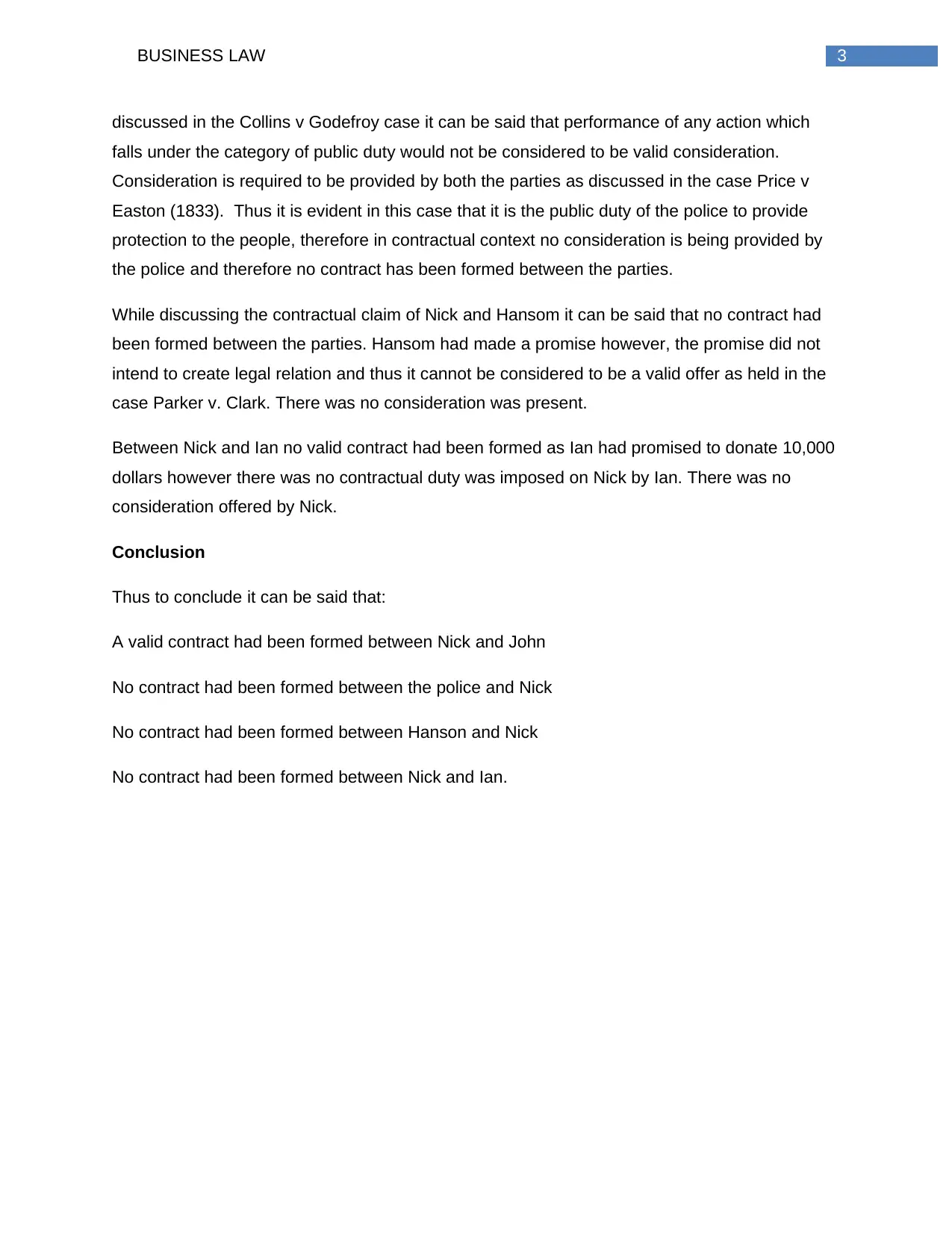
3BUSINESS LAW
discussed in the Collins v Godefroy case it can be said that performance of any action which
falls under the category of public duty would not be considered to be valid consideration.
Consideration is required to be provided by both the parties as discussed in the case Price v
Easton (1833). Thus it is evident in this case that it is the public duty of the police to provide
protection to the people, therefore in contractual context no consideration is being provided by
the police and therefore no contract has been formed between the parties.
While discussing the contractual claim of Nick and Hansom it can be said that no contract had
been formed between the parties. Hansom had made a promise however, the promise did not
intend to create legal relation and thus it cannot be considered to be a valid offer as held in the
case Parker v. Clark. There was no consideration was present.
Between Nick and Ian no valid contract had been formed as Ian had promised to donate 10,000
dollars however there was no contractual duty was imposed on Nick by Ian. There was no
consideration offered by Nick.
Conclusion
Thus to conclude it can be said that:
A valid contract had been formed between Nick and John
No contract had been formed between the police and Nick
No contract had been formed between Hanson and Nick
No contract had been formed between Nick and Ian.
discussed in the Collins v Godefroy case it can be said that performance of any action which
falls under the category of public duty would not be considered to be valid consideration.
Consideration is required to be provided by both the parties as discussed in the case Price v
Easton (1833). Thus it is evident in this case that it is the public duty of the police to provide
protection to the people, therefore in contractual context no consideration is being provided by
the police and therefore no contract has been formed between the parties.
While discussing the contractual claim of Nick and Hansom it can be said that no contract had
been formed between the parties. Hansom had made a promise however, the promise did not
intend to create legal relation and thus it cannot be considered to be a valid offer as held in the
case Parker v. Clark. There was no consideration was present.
Between Nick and Ian no valid contract had been formed as Ian had promised to donate 10,000
dollars however there was no contractual duty was imposed on Nick by Ian. There was no
consideration offered by Nick.
Conclusion
Thus to conclude it can be said that:
A valid contract had been formed between Nick and John
No contract had been formed between the police and Nick
No contract had been formed between Hanson and Nick
No contract had been formed between Nick and Ian.
Paraphrase This Document
Need a fresh take? Get an instant paraphrase of this document with our AI Paraphraser
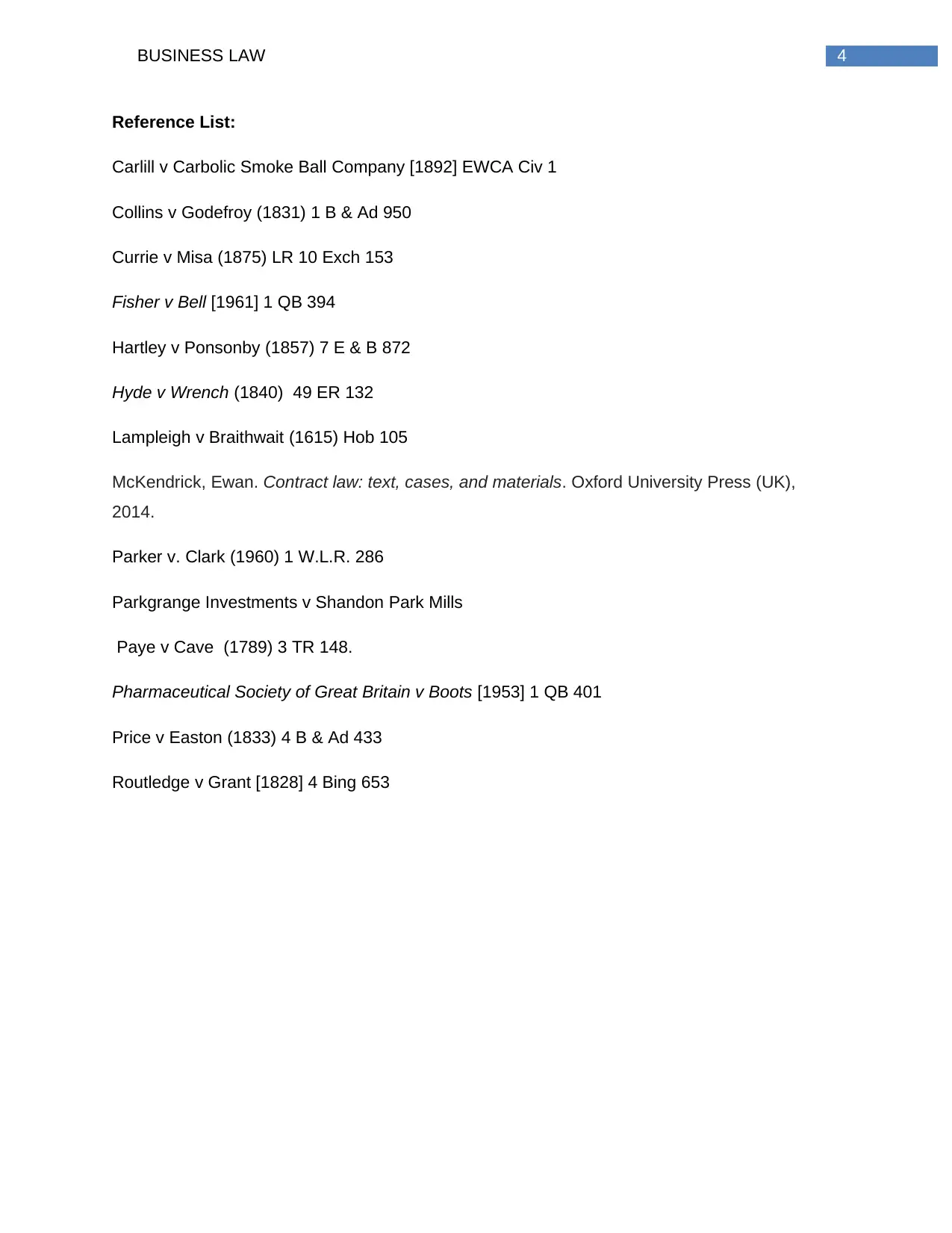
4BUSINESS LAW
Reference List:
Carlill v Carbolic Smoke Ball Company [1892] EWCA Civ 1
Collins v Godefroy (1831) 1 B & Ad 950
Currie v Misa (1875) LR 10 Exch 153
Fisher v Bell [1961] 1 QB 394
Hartley v Ponsonby (1857) 7 E & B 872
Hyde v Wrench (1840) 49 ER 132
Lampleigh v Braithwait (1615) Hob 105
McKendrick, Ewan. Contract law: text, cases, and materials. Oxford University Press (UK),
2014.
Parker v. Clark (1960) 1 W.L.R. 286
Parkgrange Investments v Shandon Park Mills
Paye v Cave (1789) 3 TR 148.
Pharmaceutical Society of Great Britain v Boots [1953] 1 QB 401
Price v Easton (1833) 4 B & Ad 433
Routledge v Grant [1828] 4 Bing 653
Reference List:
Carlill v Carbolic Smoke Ball Company [1892] EWCA Civ 1
Collins v Godefroy (1831) 1 B & Ad 950
Currie v Misa (1875) LR 10 Exch 153
Fisher v Bell [1961] 1 QB 394
Hartley v Ponsonby (1857) 7 E & B 872
Hyde v Wrench (1840) 49 ER 132
Lampleigh v Braithwait (1615) Hob 105
McKendrick, Ewan. Contract law: text, cases, and materials. Oxford University Press (UK),
2014.
Parker v. Clark (1960) 1 W.L.R. 286
Parkgrange Investments v Shandon Park Mills
Paye v Cave (1789) 3 TR 148.
Pharmaceutical Society of Great Britain v Boots [1953] 1 QB 401
Price v Easton (1833) 4 B & Ad 433
Routledge v Grant [1828] 4 Bing 653
1 out of 5
Related Documents
Your All-in-One AI-Powered Toolkit for Academic Success.
+13062052269
info@desklib.com
Available 24*7 on WhatsApp / Email
![[object Object]](/_next/static/media/star-bottom.7253800d.svg)
Unlock your academic potential
Copyright © 2020–2026 A2Z Services. All Rights Reserved. Developed and managed by ZUCOL.





